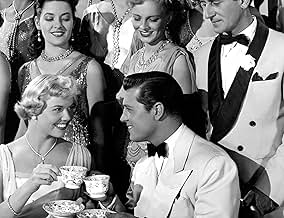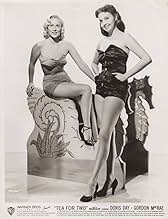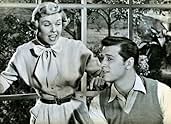अपनी भाषा में प्लॉट जोड़ेंA socialite with aspirations of a career in show business bets her wealthy uncle $25,000 that she can say "no" to everything for two days straight, hoping winning will help her fulfill her d... सभी पढ़ेंA socialite with aspirations of a career in show business bets her wealthy uncle $25,000 that she can say "no" to everything for two days straight, hoping winning will help her fulfill her dreams.A socialite with aspirations of a career in show business bets her wealthy uncle $25,000 that she can say "no" to everything for two days straight, hoping winning will help her fulfill her dreams.
- पुरस्कार
- कुल 1 जीत
- Beatrice Darcy
- (as Pat Wymore)
- Mr. Woltz - Show Backer
- (बिना क्रेडिट के)
- Chorus Boy
- (बिना क्रेडिट के)
- Chorus Boy
- (बिना क्रेडिट के)
- Chorus Boy
- (बिना क्रेडिट के)
- Friend of Lynne & Richard
- (बिना क्रेडिट के)
- Truck Driver
- (बिना क्रेडिट के)
- Theatre Manager
- (बिना क्रेडिट के)
- Taxi Driver
- (बिना क्रेडिट के)
- Lynne Smith
- (बिना क्रेडिट के)
फ़ीचर्ड समीक्षाएं
There is however a lot to like about 'Tea for Two', regardless of whether all those involved have done better in their careers. 'Tea for Two' could have been better certainly. One is aware that it has been well established that musicals are not really seen for their stories (whether it matters or not is wholly dependent on how well everything else is executed), but this story is so-so fluff at best and ridiculously daft at worst, the story being one of the most preposterous for any film musical made around this time.
Some of 'Tea for Two' feels under-directed, though not as much as the still enjoyable 'Lullaby of Broadway' (with the same director involved), more in the non-song and dance numbers than in the musical scenes themselves. This is particularly in the SZ Sakall book-ending sequences, despite Sakall's best efforts those sequences seemed under-rehearsed and added very little. Virginia Gibson's character was underwritten and in a way incomplete, there was a sense that the film wanted to do more with her but couldn't.
On the other hand, 'Tea for Two' looks great. Technicolor nearly always works wonderfully on film and particularly used to full advantage in musicals. It is a very lavishly produced film with a truly enchanting atmosphere. While not among the most memorable song scores, the songs are still incredibly pleasant and often very beautiful and puts one in a good mood, suiting the voices of Day and MacRae wonderfully. The title song, "I Only Have Eyes For You", "I Want to be Happy", "I Know that You Know" and Oh Me! Oh My!" are particularly good.
They are aided by some great choreography as well. The big standout is Gene Nelson's jaw-dropping banister sequence, which has to be seen to be believed. The script is witty and full of warm-hearted charm, a lot of the best lines coming from Eve Arden.
Day is luminous, looks very natural on screen and sings sublimely as always. MacRae would go on to better things but is charming, has a robust but beautiful baritone voice and his chemistry with Day is irresistible. Nelson once again proves himself to be quite the extraordinary dancer. Sakall plays the same character he usually does, but does it well so that doesn't matter so much, while Arden steals scenes with her terrific comic timing and witty lines. Even Billy DeWolfe, a take it or leave it performer whose shtick too often elsewhere doesn't hold up particularly well, is tolerable.
In conclusion, not perfect but a tea-licious tea-light (pardon the very cheesy pun, really struggled to come up with a review summary) that pours well. 7/10 Bethany Cox
Set notionally in 1929, the period of the original show, but barely even attempting historical accuracy, the film is really only a vehicle for Doris, Warners' new star. So little regard is had to period feel that Doris performs one number in a New Look dress. Soft-focus close-ups and jerky dialogue trundle the action from one musical set piece to the next.
The opening number in the rehearsal room is well-presented, with an attractive New York cityscape beyond the window and a nice 'infinite regression' effect in the wall mirrors. Doris sings and dances appealingly throughout, especially in "Crazy Rhythm" (in which Gene Nelson has a terrific athletic dance solo).
Gordon MacRae as Tommy gives us his usual thoroughly dependable (if uninspiring) male lead, and Patrice Wymore does her customary 'beautiful bad girl' as Bea Darcy. Pauline the wise-cracking secretary is played by Eve Arden (27 years later, the principal of Rydell High in "Grease"). The 'Charleston' sequence is a knockout, and Gene Nelson's bannister dance in "Oh Me, Oh My!" is astonishingly good. The character of Mabel Wylie (Virginia Gibson) is introduced, but then not persevered with, suggesting that some plot sections were later edited out.
Verdict - A pleasant Doris vehicle with songs cleverly embedded in a so-so plot.
Day proves what a fine vocalist she is--and Gordon MacRae proves he's no slouch with his pleasant baritone voice. Gene Nelson does some fancy footwork and there are comic highlights with Eve Arden tossing off one-liners with her usual skill and Billy deWolfe reminding us what a wonderful comedian he could be with the right material.
Pleasant, above average entertainment, well worthwhile if you like these kind of fluffy musicals.
The score is nice but not that memorable - 'Tea for Two', 'No, No, Nanette', 'I Want To Be Happy', 'Do, Do, Do' - while the story, loosely based on the play No, No, Nanette concerns rivalries, lost investments, and a comic uncle (SZ Sakall, who played the same part in countless films throughout the 1940s and 1950s). Billy de Wolfe and Patrice Wymore round out the cast as a heel of a producer and his sniping leading lady.
As a film, 'Tea for Two' passes the time and boasts some great costumes and colour, even if most of the film doesn't have a 1929 feel. And the bookending sequences, with Sakall telling a tale to a roomful of children, doesn't quite sit with the rest of the material. But it isn't bad.
Pillow Talk is another Doris Day film I would suggest. Her acting is so wonderful to watch. I have yet to see her act the same way in any movie I have had the pleasure to see. She is one of a kind. Her smile, her singing: Amazing!
क्या आपको पता है
- ट्रिवियाThe first of five collaborations between Doris Day and Gordon MacRae. They would later go on to co-star in The West Point Story (1950), On Moonlight Bay (1951), Starlift (1951) and By the Light of the Silvery Moon (1953).
- गूफ़As is customary in movies of the 1950s the hairdos are all wrong: both the men and the women wear fashions of 1950 instead of 1929.
- भाव
William 'Moe' Early: I made a fortune today. I sold short.
J. Maxwell Bloomhaus: Who did you sell short to?
William 'Moe' Early: You!
- क्रेज़ी क्रेडिटThe writing credit card originally read: Screen Play by Harry Clork, and the smudged out credit read: Suggested by the play "No, No, Nanette," by Frank Mandel, Otto Harbach, Vincent Youmans and Emil Nyitray.
Notably missing is the name of lyricist Irving Caesar, who was a co-lyricist of the original Broadway score of "No, No, Nanette." Yet receiving credit are Frank Mandel and Emil Nyitray, who actually wrote the play "My Lady Friends," on which the libretto of "Nanette" was based.
Apparently, there was a subsequent dispute involving these credits, the details of which remain obscure, but as part of the settlement of the matter, Warners agreed to blur the source credits on all future prints of the film (which now includes video, DVD, Blu-ray and cable TV versions).
- कनेक्शनFeatured in Biography: Doris Day: It's Magic (1998)
- साउंडट्रैकCharleston
Lyrics by Cecil Mack
Music by James P. Johnson (as Jimmy Johnson)
Danced by Billy De Wolfe and cast
Played at the Westchester estate
टॉप पसंद
- How long is Tea for Two?Alexa द्वारा संचालित
विवरण
- रिलीज़ की तारीख़
- कंट्री ऑफ़ ओरिजिन
- भाषा
- इस रूप में भी जाना जाता है
- Bezaubernde Frau
- फ़िल्माने की जगहें
- उत्पादन कंपनी
- IMDbPro पर और कंपनी क्रेडिट देखें
- चलने की अवधि1 घंटा 38 मिनट
- पक्ष अनुपात
- 1.37 : 1
इस पेज में योगदान दें
































